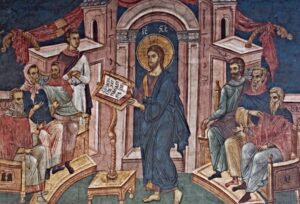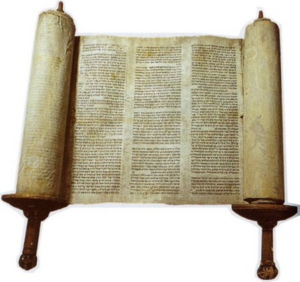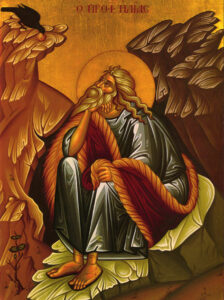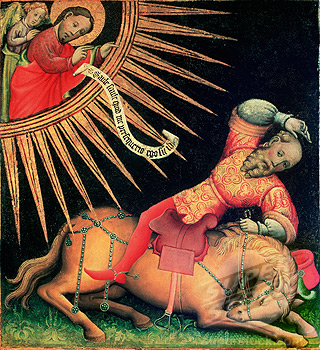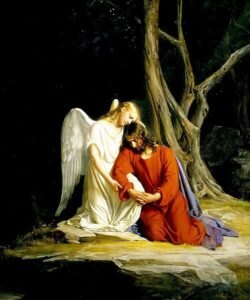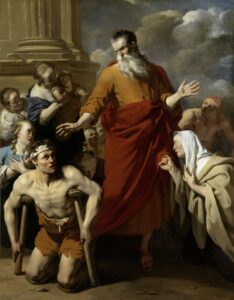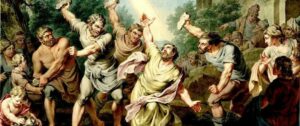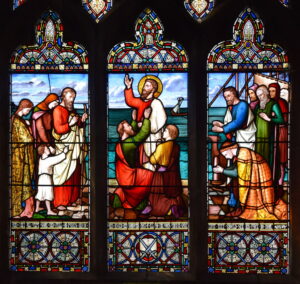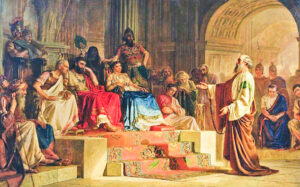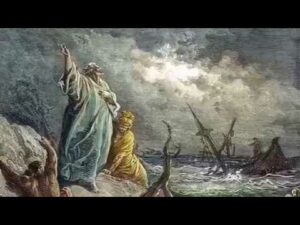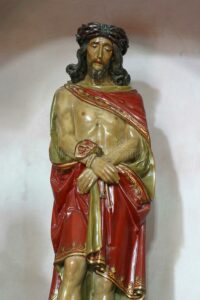The author of Acts appears to have used the life experiences, trials and death of Jesus as his model for the life and trials of Paul. The following evidence for this claim is taken from a 1975 article by A. J. Mattill, Jr., “The Jesus-Paul Parallels and the Purpose of Luke-Acts”. If one accepts that the source of Paul’s life and adventures was the Lukan account of Jesus then there are implications for the purpose of Luke-Acts and the literary-theological function of Paul himself.
The first-listed parallels may not seem so striking but keep scrolling. The four trials of each are surely worth noting. Mattill fleshes out many of the points with numerous verbal parallels but I have omitted most of those here.
Contents:
- Law-abiding since infancy
- Preaching work in synagogues
- Support from Pharisees and teaching of resurrection
- Both fulfil scripture in their missions
- Ordained servants to fulfil plan of salvation
- Divine necessity drives both
- Roles of the Spirit, Revelations and Angels
- Similar signs and wonders performed by Jesus and Paul
- Turning to the gentiles
- Journeys to Jerusalem
- Parallel Trials, Charges and Acquittals
- Deaths and resurrections
- Other parallels not in Luke
-o-
Jesus and Paul are from their childhood law-abiding Israelites
|
|
-o-
Jesus and Paul begin and continue their preaching in the synagogues
|
|
A related key parallel:
|
|
-o-
The Pharisees who believe in the resurrection affirm the teachings of Jesus and Paul
|
|
-o-
Fulfilment of Scripture
The author of Luke-Acts based his narrative around the fulfilment of scripture.
Jesus
Jesus quotes and applies Isaiah 6:9-10 to his work and response (Luke 8:10) Jesus proves by Scripture that he is
Jesus affirms from Scripture that the Gospel shall be preached
|
Paul
Paul quotes and applies Isaiah 6:9-10 to his work and response (Acts 28:25-28) Paul proves by Scripture that Jesus is
Paul affirms from Scripture that the Gospel shall be preached
|
-o-
Both are God’s ordained servants to fulfil the divine plan of salvation
| Jesus is God’s chosen servant (Luke 9:35; 23:35)
Jesus is divinely sent (Luke 4:18, 43; 9:48; 10:16)
. Jesus proclaims (Luke 4:18, 19, 44: 8:1)
. attracting multitudes by the message (Luke 5:1; 7:11; 8:4; 11:27, 29; 12:1; 14:25; 19:48; 20:1; 21:38) |
Paul is God’s chosen instrument (Acts 16:17)
Paul is divinely sent (Acts 22:21; 26:17; cf 14:4, 14)
. Paul proclaims (Acts 9:20; 19:13; 20:25; 28:31)
attracting multitudes by the message (Acts 11:26; 13:44; 14:1; 17:4; 19:10) |
-o-
Divine necessity (δει) drives the planned careers of both Jesus and Paul
| Jesus must be in his Father’s house (Luke 2:49)
He must proclaim the good news (Luke 4:43) He must go to Jerusalem (Luke 13:33) He must abide at Zacchaeus’ house (Luke 19:5) In Jerusalem he must suffer many things (Luke 17:25) then he must rise from the dead (Luke 24:7, 26) then he must be received in heaven (Acts 3:21) |
Paul is told what he must do (Acts 9:6)
He must suffer many things (Acts 9:6) He must be delivered from death when cast ashore on a certain island (Acts 27:26) He must see Rome (Acts 19:21) In Rome he must bear witness (Acts 23:11) and there must be judged (Acts 25:10) and must stand before Caesar (Acts 27:24) |
-o-
Spirit, Revelations, and Angels direct, control, assure, strengthen Jesus and Paul
| Jesus receives the Holy Spirit at baptism (Luke 3:21-22)
Jesus is “full of the holy spirit” (Luke 4:1) Jesus is controlled by the spirit — led into wilderness and returns in spirit’s power to Galilee (Luke 4:1, 14) Revelations and voices directing his ministry:
. Angel appears to Jesus in Gethsemane (Luke 22:43) |
Paul receives the Holy Spirit at baptism (Acts 9:17-18)
Paul is “full of the holy spirit” (Acts 9:17; 13:9) Paul is controlled by the spirit — forbidden to enter Asia and Bithynia, purposes in the spirit to go to Jerusalem (Acts 19:6, 7, 21) Revelations and voices directing his ministry:
Angel appears to Paul during storm at sea (Acts 27:23) |
-o-
Parallel signs and wonders confirm the teachings of Jesus and Paul
| Jesus casts out demons (Luke 4:33-37, 41; 8:26-39; 11:20)
Jesus heals the lame man (Luke 5:17-26) Jesus cures many sick (Luke 4:40; 6:17-19) Jesus cures a fever and others stream in for healing (Luke 4:38-40) Jesus raises the dead (Luke 7:11-17; 8:40-42; 49-46) . . . after affirming the person was not really dead (Luke 8:52) Jesus imparts healing power physically (Luke 5:17; 6:19; 8:46) Those healed provide Jesus with necessities (Luke 8:2-3) |
Paul casts out demons (Acts 10:38; 16:16-18)
Paul heals a lame man (Acts 14:8-14) Paul heals many sick (Acts 28:9) Paul cures a fever and others stream in for healing (Acts 28:7-10) Paul raises the dead (Acts 20:9-12) . . . after affirming the person was not really dead (Acts 20:10) Paul imparts healing power physically (Acts 19:6, 11-12) Those healed provide Paul with necessities (Acts 28:10) |
-o-
Turning to the Gentiles is a theme of both Jesus and Paul
| Jesus is rejected and persecuted by his own people from the beginning (Nazareth) of his ministry (Luke 4:28-29)
and often thereafter (Luke 5:21-30; 6:1-5, 6-11; 7:39; 11:14-23, 53-54; 13:14-17; 14:1-6; 15:2; 16:14-15; 19:39-48; 20:1-8, 19-26, 27-40; 22:2-6, 47-53, 66-71; 23:1-43) Jesus is taken outside a city (ἔξω τῆς πόλεως) and threatened with stoning, but escapes with his life (Luke 4:29-30) Audience is enraged when Jesus speaks of gentiles (Luke 4:27-28) Jews lie in wait (ἐνεδρεύοντες) to kill Jesus (Luke 11:54) Jesus declares that just as in days of old Jews to be rejected and gentiles accepted Jesus travels through Samaria (prefiguring Paul) (Luke 9:51-19:44) Jesus sends out the 70 symbolizing the evangelization of every nation (Luke 10:1-16) Teaches the rejection of Israel (Luke 20:9-19) and commands the gentile mission (Luke 24:46-47; Acts 1:8; 22:21) From the Law and Prophets Jesus proclaims the passion, resurrection and ensuing gentile mission (Luke 24:44-47) Jesus proclaims repentance is to be preached to all (Luke 24:47) Jesus is a light revealing salvation to the world (Luke 2:32) |
Paul is rejected and persecuted by his own people from the beginning (Damascus) of his ministry (Acts 9:23)
and often thereafter (Acts 9:23-24, 29-30; 13:45-51; 14:2-6, 19; 17:5-15; 18:6-12; 19:8-9; 20:3; 21:27-23:22; 24:1-9; 28:23-28) Paul is taken outside a city (ἔξω τῆς πόλεως) and stoned by escapes with his life (Acts 14:19-20) Audience is enraged when Paul speaks of gentiles (Acts 18:47-50; 22:21-22) Jews lie in wait (ἐνεδρεύουσιν) to kill Paul (Acts 23:21) Paul declares that just as in days of old Jews to be rejected and gentiles accepted After first preaching to Jews everywhere (Antioch Acts 13:46-47), Corinth (18:6), Ephesus (19:9) and Rome (28:24-28 — quoting Isaiah 6:9-10, cf Luke 8:10) Paul travels through Samaria, reporting how gentiles turned to God (Acts 15:3) . From the Law and Prophets Paul proclaims the passion, resurrection and ensuing gentile mission (Acts 26:22-23) Paul proclaims repentance is to be preached to all (Acts 17:30) Paul is a light revealing salvation to the world (Acts 13:47; 26:23) |
-o-
Journey to Jerusalem and the Passion
The two great travel sections: Luke 9:51-19:44 and Acts 19:21-28:31
Luke 9:51-52 As the time approached for him to be taken up to heaven, Jesus resolutely set out for Jerusalem. 52 And he sent messengers on ahead, who went into a Samaritan village to get things ready for him
Acts 19:21-22 After all this had happened, Paul decided[a] to go to Jerusalem, passing through Macedonia and Achaia. “After I have been there,” he said, “I must visit Rome also.” 22 He sent two of his helpers, Timothy and Erastus, to Macedonia, while he stayed in the province of Asia a little longer.
| A last journey to Jerusalem is a journey toward passion, as prophesied, knowing that he will be handed over to gentiles: (Luke 18:31-33; 9:44)
The ultimate scene of persecution was Jerusalem where the leaders sought his death (Luke 19:47) Jerusalem is the place where prophets must die (Luke 13:33) Jesus is opposed by the Sadducees who deny the resurrection (Luke 20:27) Jesus is accused by the Sadducean high priesthood (Luke 20:27) Jesus delivers farewell addresses (Luke 20:45-21:36; 22:14-38; 24: 36-53) In his last words (Luke 20-22)
Not a hair of your head will perish (Luke 21:18) The Temple is the setting for the prelude to Jesus’ passion (Luke 21:37) Jews plot treachery to kill Jesus (Luke 22:2-6) Jesus is severely tempted to abandon his purpose to die (Luke 22:40-44) — “thy will be done” Jesus is seized at Jerusalem by the Jews (Luke 22:54) Jesus expostulates with his opponents (Luke 22:52-53) |
A last journey to Jerusalem is a journey toward passion, as prophesied, knowing that he will be handed over to gentiles: (Acts 20:22-23; 21:10-11; 28:17)
The ultimate scene of persecution was Jerusalem where the leaders sought his death (Acts 25:2-3) Jerusalem is the place where prophets are expected to die (Acts 21:30-36; 22:22-25; 23:12-22; 25:1-12) Paul is opposed by the Sadducees who deny the resurrection (Acts 23:8) Paul is accused by the Sadducean high priesthood (Acts 23:6-8) Paul delivers farewell addresses (Acts 20:1, 7; 20:18-35) In his last words (Acts 20:18-35)
Not a hair of your head will perish (Acts 27:34) The Temple is the setting for the prelude to Paul’s passion (Acts 21:26) Jews plot treachery to kill Paul (Acts 23:12-16) Paul is severely tempted to abandon his purpose to be ready to die (Acts 21:13; 20:23; 21:4, 10-14) — the Lord’s will be done” Paul is seized at Jerusalem by the Jews (Acts 21:27) Paul expostulates with his opponents (Acts 21:40-22:21) |
-o-
Parallel Trials, Charges and Acquittals
Four trials of Jesus
Jesus is accused of
Pilate asks where Jesus is from and then sends him to the authority (Herod) of that region (Galilee) (Luke 23:6-7)
Roman authority Pontius Pilate finds no guilt in Jesus (Luke 23:4) Pilate exonerates Jesus (“I have found no basis for your charges against this man”) (Luke 23:14) Roman governor Pilate finds Jesus has done nothing worthy of death (Luke 23:15, 22) Pilate would have released Jesus (Luke 23:16, 20) The crowd shout for Jesus’ death (Luke 23:18, 21)
|
Four trials of Paul
Paul is accused of
Felix asks Paul where he is from and then holds him until he can be heard before the relevant authority (Acts 23:34-35)
Roman authority Claudius Lysias finds no guilt in Paul (Acts 23:29) Pharisees exonerate Paul (“we find nothing wrong with this man”) (Acts 23:9) Roman governor Festus finds Paul has done nothing worthy of death (Acts 25:25; 26:31) Agrippa would have released Paul (Acts 26:32) The crowd shouts for Paul’s death (Acts 21:36; 22:22) |
| Jesus was shamefully treated in Jerusalem (Luke 18:32)
Last Supper – take bread, give thanks, break it (Luke 22:19) The people are numbered, Jesus takes bread, gives thanks, breaks bread, feeds the people (Luke 9:12-17) Jesus is accompanied by malefactors (Luke 22:37; 23:32) Jesus kneels to pray (usual posture was to stand) (Luke 22:41) At his trial Jesus is struck by one nearby (Luke 22:63) Jesus is brought before the Sanhedrin “the next day” (not night, as in Mark) (Luke 22:66) Jesus is “delivered up” by Pilate to his captors (Luke 23:25) A crowd follows Jesus (Luke 23:27) |
Paul was shamefully treated at Iconium (Acts 14:5)
Meal aboard ship — take bread, give thanks, break it (Acts 27:33-38) The people are numbered, Paul takes bread, gives thanks, breaks bread, feeds the people (Acts 27:33-38) Paul is accompanied by malefactors (Acts 27:1) Paul kneels to pray (Acts 20:36) At his trial Paul is struck by one nearby (Acts 22:30) Paul is brought before the Sanhedrin “the next day” (Acts 22:30) Paul is “delivered up” by Festus to his captors (Acts 27:1) A crowd follows Paul (Acts 21:36) |
-o-
Paul’s shipwreck and plunging into the deep are the counterparts to Jesus’ death on the cross (Luke 23:26-49; Acts 27:14-24). . . .
Goulder strengthens the argument for the parallel between “Paul’s shipwreck and deliverance and Jesus’ death and resurrection”. To the Semites “death was like going into the sea …. All the sea is death to the Semite, whether we drown or whether we paddle and come out again …” Paul himself refers to his shipwrecks as “deaths” and his rescues as “resurrections” (II Cor. 1:8-10; 11:23)
Going down in a storm was the metaphor par excellence in scripture for death, and being saved from one for resurrection: when St Paul speaks of his shipwrecks in these terms, how can St Luke have thought otherwise ? He has shaped his book to lead up to the passion of Christ’s apostle from xix 21 on in such a way as to recall what led up to the passion of Christ himself in the earlier book: and as the climax of the Gospel is the death and resurrection of Christ, so the climax of Acts is the thanatos and anastasis of Paul.
(Mattill, pp. 19, 21)
| An amazed centurion judges Jesus to be a righteous man (Luke 23:47)
Jesus was three days in the grave (Luke 23:50-56) Jesus was rescued from death (Luke 24:1-11) Post-resurrection joy (Luke 24:12-49) |
An amazed Maltese judges Paul to be a god (Acts 28:6)
Paul was at rest and peace for three winter months cut off from the outside world (Acts 28:1-10) (28:11 – “3 months”) Paul was rescued from death at sea at Malta (Acts 27:39-44) Paul’s voyage to Rome in spring which was Paul’s entrance into a new life (Acts 28:11-16) |
-o-
Other parallels though not in Luke
(If Luke was the last written gospel and its author knew the other three, as some have argued…?)
| Jesus is said to be out of his mind (Mark 3:21)
Jesus is bound (Mark 15:1) Jesus is challenged over disrespect to high priest (John 18:22) Jesus comes before a judge whose wife is mentioned (Matthew 27:19) Jesus’ judges wish to please the Jews (Mark 15:15) Earthquake while on cross (Matthew 27:51) |
Paul is said to be out of his mind (Acts 26:24)
Paul is bound (Acts 21:11, 33; 24:27) Paul is challenged over disrespect to high priest (Acts 23:4) Paul comes before a judge whose wife is mentioned (Acts 24:24) Paul’s judges wish to please the Jews (Acts 24:27; 25:9) Earthquake while in prison (Acts 16:26) |
-o-
Mattill, A. J. “The Jesus-Paul Parallels and the Purpose of Luke-Acts: H. H. Evans Reconsidered.” Novum Testamentum 17, no. 1 (1975): 15–46. https://doi.org/10.2307/1560195 / https://www.jstor.org/stable/1560195

